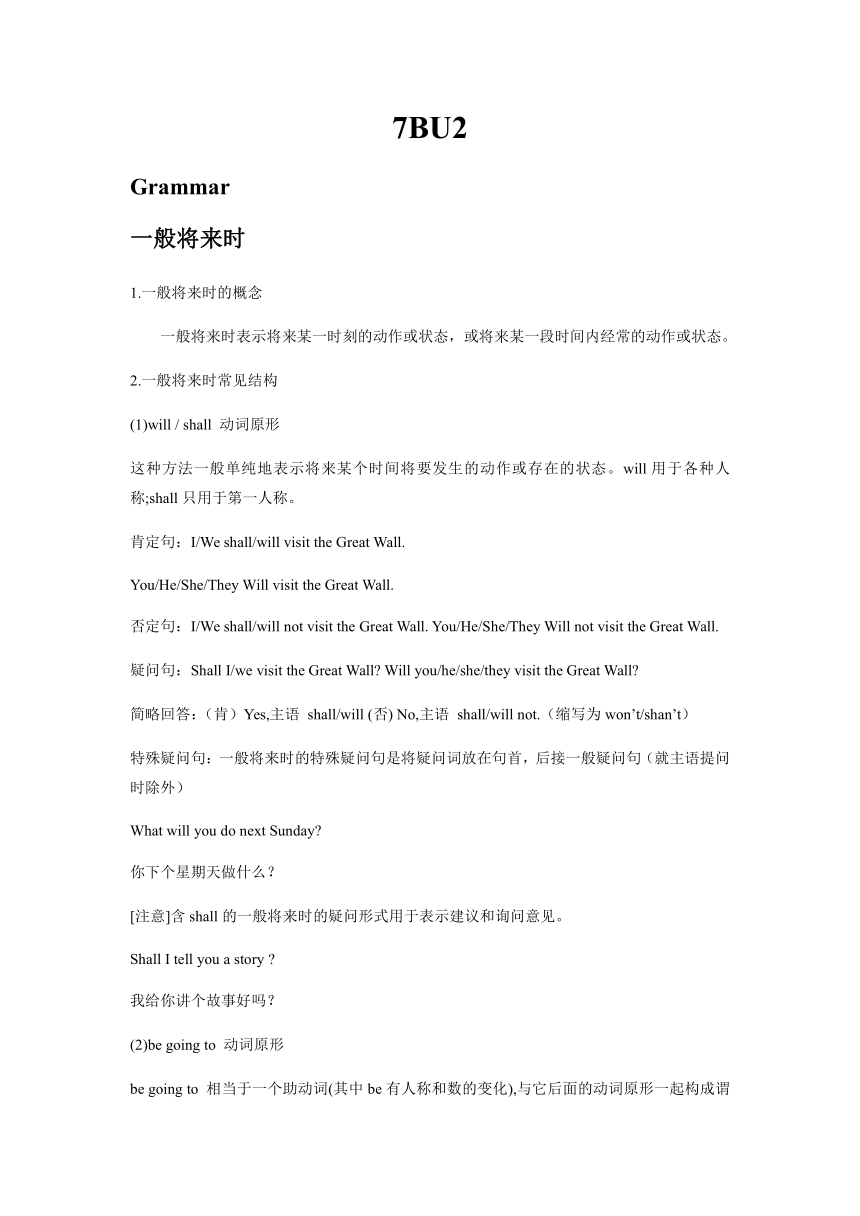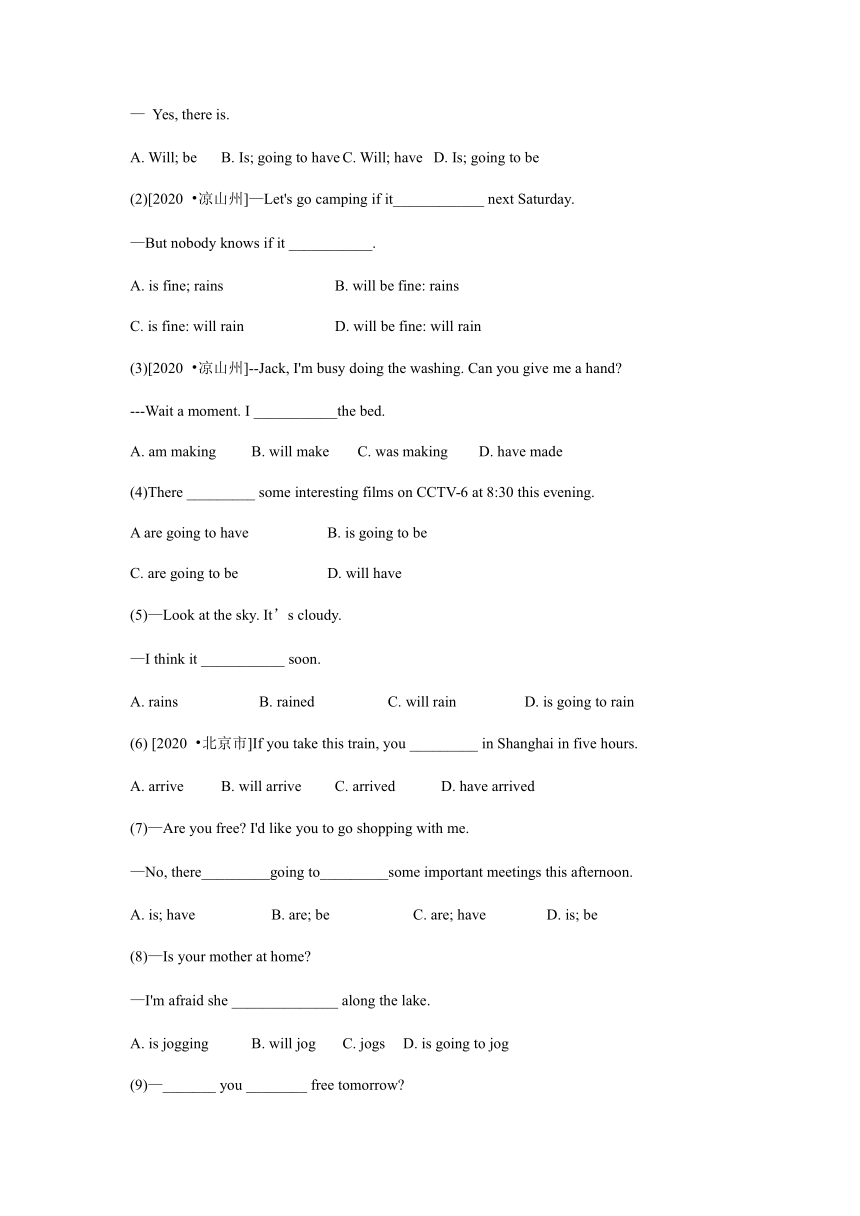牛津译林版英语七年级下Unit 2 Neighbours Grammar知识点整理及练习(含答案)
文档属性
| 名称 | 牛津译林版英语七年级下Unit 2 Neighbours Grammar知识点整理及练习(含答案) |  | |
| 格式 | docx | ||
| 文件大小 | 19.0KB | ||
| 资源类型 | 教案 | ||
| 版本资源 | 牛津译林版 | ||
| 科目 | 英语 | ||
| 更新时间 | 2021-02-28 07:48:41 | ||
图片预览



文档简介
11201400102108007BU2
Grammar
一般将来时
1.一般将来时的概念
一般将来时表示将来某一时刻的动作或状态,或将来某一段时间内经常的动作或状态。
2.一般将来时常见结构
(1)will / shall 动词原形
这种方法一般单纯地表示将来某个时间将要发生的动作或存在的状态。will用于各种人称;shall只用于第一人称。
肯定句:I/We shall/will visit the Great Wall.
You/He/She/They Will visit the Great Wall.
否定句:I/We shall/will not visit the Great Wall. You/He/She/They Will not visit the Great Wall.
疑问句:Shall I/we visit the Great Wall? Will you/he/she/they visit the Great Wall?
简略回答:(肯)Yes,主语 shall/will (否) No,主语 shall/will not.(缩写为won’t/shan’t)
特殊疑问句:一般将来时的特殊疑问句是将疑问词放在句首,后接一般疑问句(就主语提问时除外)
What will you do next Sunday?
你下个星期天做什么?
[注意]含shall的一般将来时的疑问形式用于表示建议和询问意见。
Shall I tell you a story ?
我给你讲个故事好吗?
(2)be going to 动词原形
be going to 相当于一个助动词(其中be有人称和数的变化),与它后面的动词原形一起构成谓语。用来表示近期将要发生的动作或存在的状态,以及计划、安排、打算要做的事。
There are going to be two meetings this afternoon.
今天下午将有两个会议。
3.一般将来时常用的时间状语
①由tomorrow 组成的,如:tomorrow morning/evening明天早晨、晚上
the day after tomorrow 后天
②由next组成的,如:next Tuesday/Sunday 下周二/日
③由this 组成的,如:this afternoon/evening 今天下午/晚上
④由coming组成的,如:the coming Sunday 下个星期天
[注意]这些表时间的单词或短语的前面都不能加介词
⑤由in组成的,如:in two hours 在2小时内, in a few days 在几天内
in the future 在未来
⑥其他:tonight(今晚),from now on(从现在开始),soon(不久)等。
4.几种一般将来时的特殊用法
(1)在英语中,有些动词如go,come,leave,arrive,fly,move,die等可用现在进行时表示将要发生的动作。
I am leaving for Hainan tomorrow.
明天我要到海南去。
(2)在含有条件状语从句或时间状语从句的复合句中,从句用一般现在时,主句用一般将来时(用will而不用be going to)。
You'll be in time if you hurry.
你要是抓紧一点儿就会来得及。
[经典例题]
(1) —_________there_________a football match next month?
— Yes, there is.
A. Will; be B. Is; going to have C. Will; have D. Is; going to be
(2)[2020 ?凉山州]—Let's go camping if it____________ next Saturday.
—But nobody knows if it ___________.
A. is fine; rains B. will be fine: rains
C. is fine: will rain D. will be fine: will rain
(3)[2020 ?凉山州]--Jack, I'm busy doing the washing. Can you give me a hand?
---Wait a moment. I ___________the bed.
A. am making B. will make C. was making D. have made
(4)There _________ some interesting films on CCTV-6 at 8:30 this evening.
A are going to have B. is going to be
C. are going to be D. will have
(5)—Look at the sky. It’s cloudy.
—I think it ___________ soon.
A. rains B. rained C. will rain D. is going to rain
(6) [2020 ?北京市]If you take this train, you _________ in Shanghai in five hours.
A. arrive B. will arrive C. arrived D. have arrived
(7)—Are you free? I'd like you to go shopping with me.
—No, there_________going to_________some important meetings this afternoon.
A. is; have B. are; be C. are; have D. is; be
(8)—Is your mother at home?
—I'm afraid she ______________ along the lake.
A. is jogging B. will jog C. jogs D. is going to jog
(9)—_______ you ________ free tomorrow?
—Yes, but I _________ have time the day after tomorrow.
A. Are; going to; won’t be B. Are; going to be; won’t
C. Are; going to; won’t D. Are; going to be; won’t be
(10)—Linda, shall we go to fly kites by the lake next Sunday?
—I’m afraid not. My mother and I ________ my grandma that day.
A.shall visit B. are visiting C. are going to visit D. visit
(11)There_____a baseball game between these two grades in the gym this afternoon.
A will B. is going to have
C. is going to be D. will have
(12)There_________two important meetings tomorrow afternoon.
A.will going to B.is going to be C.are going to D.will be
(13)[2020 ?黑龙江绥化]We can't leave here until our teacher __________.
A. will arrive B. arrives C. arrived D.is arriving
(14)--- Mum, my computer doesn’t work.
--- Don’t worry. Your father__________it for you after work.
A. checks B. will check C. check D. going to check
(15)—How many children do most post-80s families have?
—One. They ____________ two in the future, I guess.
A. will have B. had C. have D. have had
(16)My washing machine is broken. An engineer_________me fix it tomorrow morning.
A. helps B. helped C. will help D. is helping
(17)My parents will take me to the park if they ____ tomorrow.
A. will have free B. will be free C. have free D. are free
(18)[2020 ?辽宁丹东]John________ us when he is free.
A. joins B. join C. will join D. joined
(19)—I hope you ________ to my birthday party next Sunday.
—OK, I ________.
A. to come, will B. to come, am
C. can come, will D. can come, am
(20)If you ______ late, you’ll miss watching the wonderful opera shows.
A. will be B. don’t be C. are D. aren’t
(21)[2020?黄冈市]—I________to Hainan on vacation with my parents this coming summer holiday.
—That's great!
A. go B. went C. will go D. have gone
(22)—Sorry I forget to send the letter for you.
—Never mind. Sandy__________it for me tonight.
A. sends B. will send C. is sending D. shall send
(23) Mr. Smith hopes ________ play computer games any more.
A. us not to B. we will C. we don't D. we won't
(24)—Is it easy________to your building?
—Yes, follow the route and you________it.
A. to walk; will find B. walking; will find
C. to walk; to find D. walking; find
(25)[2020?武汉市]—Is Helen here?
—Not yet, but she______________ in half hour.
A. arrives B. will arrive C. arrived D. has arrived
答案:1-5DCACD 6-10BBABC 11-15CDBBA 16-20CDCCC
21-25CBDAB
【知识梳理1】My parents and I are planning a day out with my uncle’s family the day after tomorrow.(P24)
the day after tomorrow意为“后天”,表示将来时间。
She's leaving the day after tomorrow.
她定于后天离开。
【知识梳理2】He will make a fire.(P24)
他打算生火。
make a fire,意为“生火”,还可以用start a fire来表达相同的意思。
Let's make a fire to warm up.
我们生个火吧,暖和一下吧。
[经典例题]
(1)It’s too cold in the room. Let’s _____to keep warm.
A.make fire B.make a fire C.making fire D. making a fire
(2)We can make a fire_______ the room warm.
A. to keep B. keeping C. keep D. keeps
(3)It’s too cold. How about__________?
A.making fire B. make a fire
C. making a fire D. make fire
答案:BAC
Grammar
一般将来时
1.一般将来时的概念
一般将来时表示将来某一时刻的动作或状态,或将来某一段时间内经常的动作或状态。
2.一般将来时常见结构
(1)will / shall 动词原形
这种方法一般单纯地表示将来某个时间将要发生的动作或存在的状态。will用于各种人称;shall只用于第一人称。
肯定句:I/We shall/will visit the Great Wall.
You/He/She/They Will visit the Great Wall.
否定句:I/We shall/will not visit the Great Wall. You/He/She/They Will not visit the Great Wall.
疑问句:Shall I/we visit the Great Wall? Will you/he/she/they visit the Great Wall?
简略回答:(肯)Yes,主语 shall/will (否) No,主语 shall/will not.(缩写为won’t/shan’t)
特殊疑问句:一般将来时的特殊疑问句是将疑问词放在句首,后接一般疑问句(就主语提问时除外)
What will you do next Sunday?
你下个星期天做什么?
[注意]含shall的一般将来时的疑问形式用于表示建议和询问意见。
Shall I tell you a story ?
我给你讲个故事好吗?
(2)be going to 动词原形
be going to 相当于一个助动词(其中be有人称和数的变化),与它后面的动词原形一起构成谓语。用来表示近期将要发生的动作或存在的状态,以及计划、安排、打算要做的事。
There are going to be two meetings this afternoon.
今天下午将有两个会议。
3.一般将来时常用的时间状语
①由tomorrow 组成的,如:tomorrow morning/evening明天早晨、晚上
the day after tomorrow 后天
②由next组成的,如:next Tuesday/Sunday 下周二/日
③由this 组成的,如:this afternoon/evening 今天下午/晚上
④由coming组成的,如:the coming Sunday 下个星期天
[注意]这些表时间的单词或短语的前面都不能加介词
⑤由in组成的,如:in two hours 在2小时内, in a few days 在几天内
in the future 在未来
⑥其他:tonight(今晚),from now on(从现在开始),soon(不久)等。
4.几种一般将来时的特殊用法
(1)在英语中,有些动词如go,come,leave,arrive,fly,move,die等可用现在进行时表示将要发生的动作。
I am leaving for Hainan tomorrow.
明天我要到海南去。
(2)在含有条件状语从句或时间状语从句的复合句中,从句用一般现在时,主句用一般将来时(用will而不用be going to)。
You'll be in time if you hurry.
你要是抓紧一点儿就会来得及。
[经典例题]
(1) —_________there_________a football match next month?
— Yes, there is.
A. Will; be B. Is; going to have C. Will; have D. Is; going to be
(2)[2020 ?凉山州]—Let's go camping if it____________ next Saturday.
—But nobody knows if it ___________.
A. is fine; rains B. will be fine: rains
C. is fine: will rain D. will be fine: will rain
(3)[2020 ?凉山州]--Jack, I'm busy doing the washing. Can you give me a hand?
---Wait a moment. I ___________the bed.
A. am making B. will make C. was making D. have made
(4)There _________ some interesting films on CCTV-6 at 8:30 this evening.
A are going to have B. is going to be
C. are going to be D. will have
(5)—Look at the sky. It’s cloudy.
—I think it ___________ soon.
A. rains B. rained C. will rain D. is going to rain
(6) [2020 ?北京市]If you take this train, you _________ in Shanghai in five hours.
A. arrive B. will arrive C. arrived D. have arrived
(7)—Are you free? I'd like you to go shopping with me.
—No, there_________going to_________some important meetings this afternoon.
A. is; have B. are; be C. are; have D. is; be
(8)—Is your mother at home?
—I'm afraid she ______________ along the lake.
A. is jogging B. will jog C. jogs D. is going to jog
(9)—_______ you ________ free tomorrow?
—Yes, but I _________ have time the day after tomorrow.
A. Are; going to; won’t be B. Are; going to be; won’t
C. Are; going to; won’t D. Are; going to be; won’t be
(10)—Linda, shall we go to fly kites by the lake next Sunday?
—I’m afraid not. My mother and I ________ my grandma that day.
A.shall visit B. are visiting C. are going to visit D. visit
(11)There_____a baseball game between these two grades in the gym this afternoon.
A will B. is going to have
C. is going to be D. will have
(12)There_________two important meetings tomorrow afternoon.
A.will going to B.is going to be C.are going to D.will be
(13)[2020 ?黑龙江绥化]We can't leave here until our teacher __________.
A. will arrive B. arrives C. arrived D.is arriving
(14)--- Mum, my computer doesn’t work.
--- Don’t worry. Your father__________it for you after work.
A. checks B. will check C. check D. going to check
(15)—How many children do most post-80s families have?
—One. They ____________ two in the future, I guess.
A. will have B. had C. have D. have had
(16)My washing machine is broken. An engineer_________me fix it tomorrow morning.
A. helps B. helped C. will help D. is helping
(17)My parents will take me to the park if they ____ tomorrow.
A. will have free B. will be free C. have free D. are free
(18)[2020 ?辽宁丹东]John________ us when he is free.
A. joins B. join C. will join D. joined
(19)—I hope you ________ to my birthday party next Sunday.
—OK, I ________.
A. to come, will B. to come, am
C. can come, will D. can come, am
(20)If you ______ late, you’ll miss watching the wonderful opera shows.
A. will be B. don’t be C. are D. aren’t
(21)[2020?黄冈市]—I________to Hainan on vacation with my parents this coming summer holiday.
—That's great!
A. go B. went C. will go D. have gone
(22)—Sorry I forget to send the letter for you.
—Never mind. Sandy__________it for me tonight.
A. sends B. will send C. is sending D. shall send
(23) Mr. Smith hopes ________ play computer games any more.
A. us not to B. we will C. we don't D. we won't
(24)—Is it easy________to your building?
—Yes, follow the route and you________it.
A. to walk; will find B. walking; will find
C. to walk; to find D. walking; find
(25)[2020?武汉市]—Is Helen here?
—Not yet, but she______________ in half hour.
A. arrives B. will arrive C. arrived D. has arrived
答案:1-5DCACD 6-10BBABC 11-15CDBBA 16-20CDCCC
21-25CBDAB
【知识梳理1】My parents and I are planning a day out with my uncle’s family the day after tomorrow.(P24)
the day after tomorrow意为“后天”,表示将来时间。
She's leaving the day after tomorrow.
她定于后天离开。
【知识梳理2】He will make a fire.(P24)
他打算生火。
make a fire,意为“生火”,还可以用start a fire来表达相同的意思。
Let's make a fire to warm up.
我们生个火吧,暖和一下吧。
[经典例题]
(1)It’s too cold in the room. Let’s _____to keep warm.
A.make fire B.make a fire C.making fire D. making a fire
(2)We can make a fire_______ the room warm.
A. to keep B. keeping C. keep D. keeps
(3)It’s too cold. How about__________?
A.making fire B. make a fire
C. making a fire D. make fire
答案:BAC
